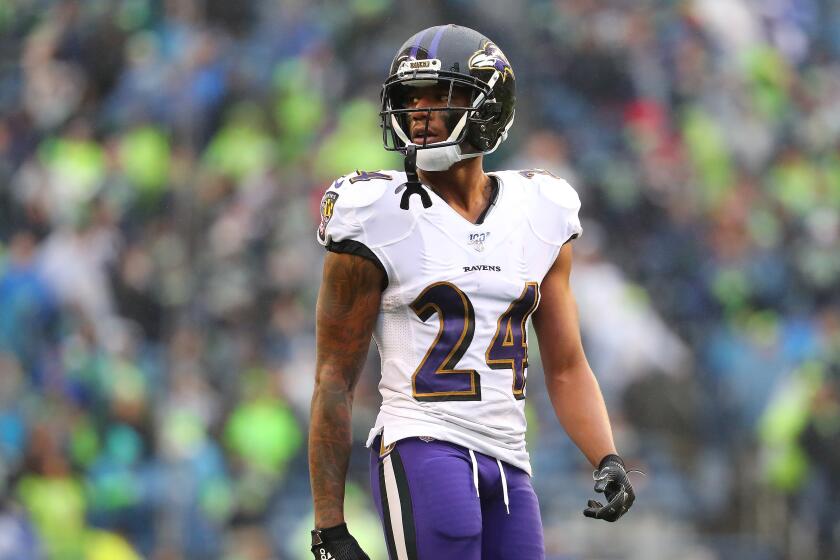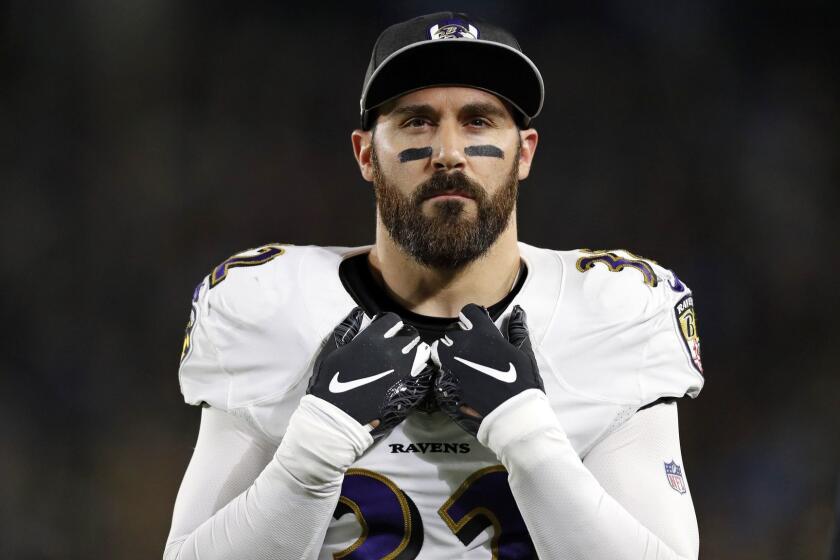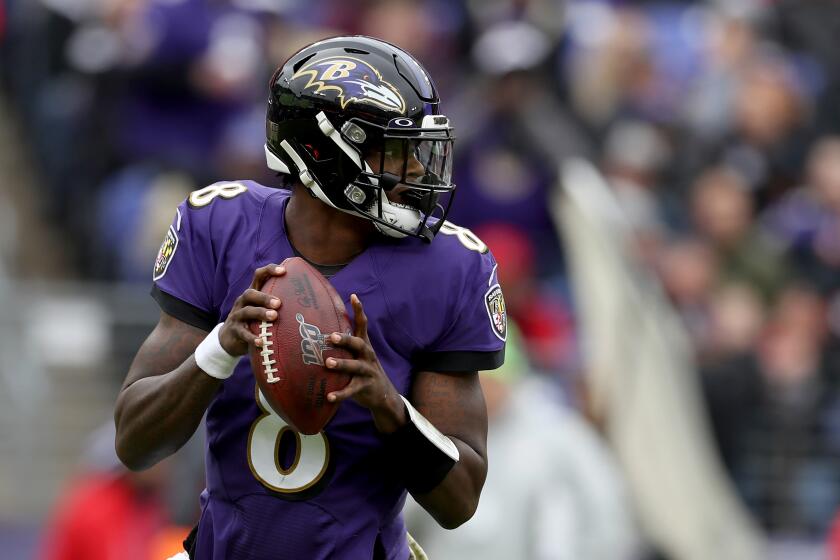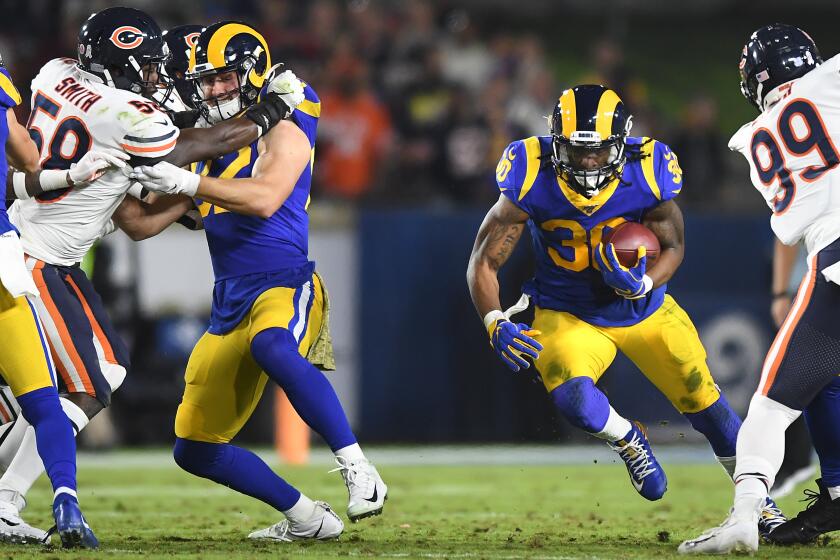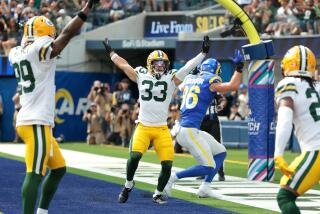Column: Superbad, D-Tack, Vapor Jet. These are the tools that keep Rams well-equipped
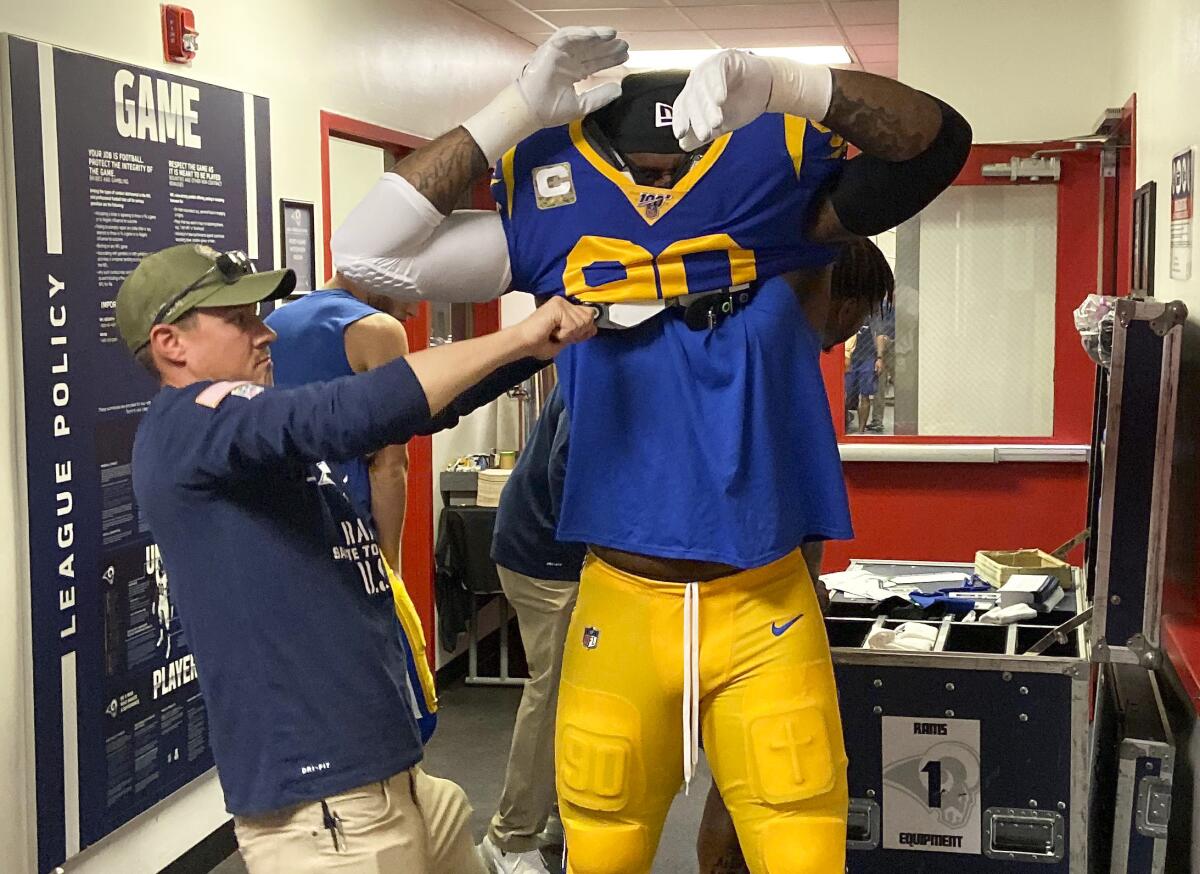
It’s an hour before kickoff of Sunday night’s game against the Chicago Bears, and fights are breaking out all over the Rams’ locker room. Not teammates squaring off, but player versus pads, with huge men struggling to wriggle into their armor.
Everyone requires a helper, and linebacker Kenny Young needs two. He likes his jersey and shoulder pads so skin tight, he has an equipment man on each side latching on and sinking his body weight to the floor. By the time they’re done, all three men are sweating.
“Two guys to put them on, and three to take them off,” Young said later. “It’s like fighting a bear.”
And it’s just another Sunday in the life of Rams equipment manager Brendan Burger, who provided The Times unprecedented behind-the-scenes access to observe what he and his crew do from start to finish on game day.
“Those guys are the heartbeat of this team,” safety Eric Weddle said. “They make sure we’re not thinking about anything with equipment, with shoes, socks, the way your jersey is, how tight you want it, how loose. Everything is all taken care of, so you’re not thinking about a thing. And if you need anything, boom, they’re on it in seconds.”
The Rams will be in their own stadium in Inglewood starting next season. But for now they have to transport 36,000 pounds of equipment from their facility in Thousand Oaks to the Coliseum for home games. They haul it in two box trucks packed to the brim and parked on the ramp outside the locker room. The cargo includes all the equipment for the players, coaches, trainers, and video team.
Baltimore Ravens cornerback Marcus Peters says his first game against a Rams team that traded him away last month won’t serve as a source of extra motivation.
“Every game is a road game for us,” said Burger, 33, who started with the Miami Dolphins, spent six years with the New York Jets, then ran the equipment departments at UCLA and Rutgers before returning to the NFL. He’s in his first year with the Rams, and has a staff of four full-time assistants, and five part-timers.
NFL equipment jobs are coveted and demanding, with workdays that routinely stretch into the wee hours of the morning. Burger began his career as a summer intern with the Miami Dolphins, although many equipment workers begin in college as football managers. The Rams’ staff is all male, although some NFL teams have had female workers in their equipment departments. With most franchises, if their team wins the Super Bowl, each member of the equipment staff gets a ring.
The responsibilities of the Rams’ staff are precise and regimented. Among Burger’s assistants are Darwin Beacham, who oversees the maintenance, repair, and customization of uniforms; Ben Bloomer and Evan Sharpe, responsible for helmet maintenance, decaling and inspection; Luis Ramos, who takes care of cleats and gloves for players, as well as packing bags for player travel; Matt Taylor, who packs for coaches and staff (about 60 people per week), with gear changing almost weekly depending on uniform and league initiatives; Kevin Blank, in charge of game-ball preparations and meeting with quarterback Jared Goff to check the footballs before games; and Adam “Merg” Mirghanbari, the lead ballboy, who also handles the footballs reserved for kicks.
Providing USC isn’t playing at home, Burger and his crew load the trucks Saturday morning and make the 45-minute drive to the Coliseum, where they unpack and begin the set-up process in the cramped confines of the 96-year old stadium.
Burger is a stickler for details and is borderline obsessive-compulsive about having every chair lined up perfectly in front of every locker, and the shoulder pads and helmets resting on the shelves just so.
Next to the locker room is a small equipment room with blue trunks on wheels lining the walls. The containers have all sorts of drawers and cupboards, everything neatly labeled. There’s a drawer filled with binoculars for coaches, and another for clipboards. There are screw-on studs for cleats, wrenches, pliers, belt-punchers, compression sleeves, socks, backup shoulder pads, neck rolls, back plates …
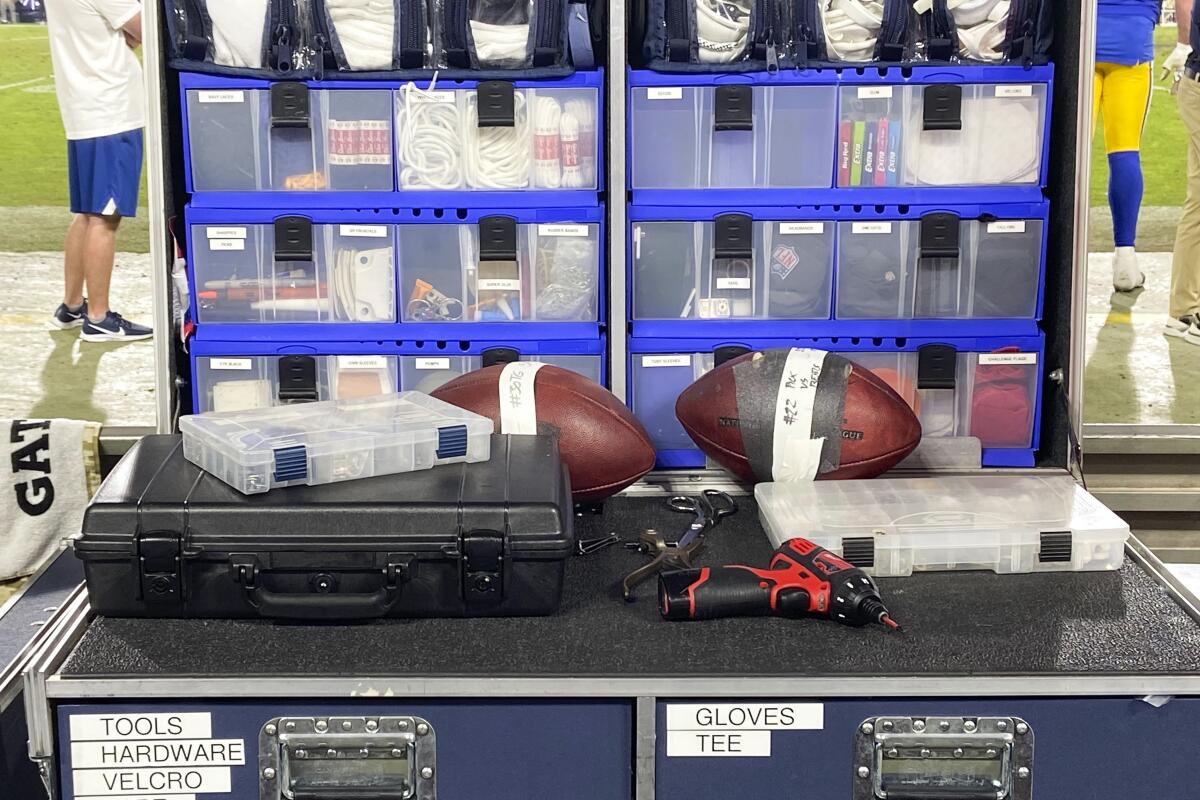
Even though the crew seemingly has everything under the sun in those trunks, they still have to improvise from time to time. For instance, in a pinch, Burger has mended a torn jersey with a shoelace. The show must go on.
There’s a heat press for making jerseys on site, and a shoe steamer to reshape a cleat that isn’t fitting quite right. There’s an entire trunk for gloves with names such as Superbad, D-Tack, and Vapor Jet, and a massive bag on top filled with even more gloves. Some players go through two or three pairs per game.
One trunk is essentially a candy store, with every flavor of gum, pouches of mixed nuts, boxes of the candy, Nerds, and packages of peanut-butter crackers. That’s mostly for the coaches, some of whom sit up in the press box, but players occasionally chew gum on the sideline.
Players are issued one helmet for the season, so those different colors are actually decals that are applied depending on the uniform. The equipment staff works with the no-nonsense efficiency of a NASCAR pit crew, needing just 10 minutes to change a helmet from, say, blue and yellow with a blue facemask, to blue and white with a white facemask.
Some Rams want a visor covering their eyes during the week, but nothing during the game. Others choose the opposite. And those players who are especially particular about their look might opt to wear a reflective visor during pre-game warmups even though the NFL doesn’t allow those during the actual games.
Rams’ Eric Weddle has such great ties to Ravens that safety would not think of divulging trade secrets as his new team prepares for “Monday Night Football.”
It’s up to the equipment workers to attach those visors for warmups, then remove them for the game so the players aren’t fined. Before Sunday’s prime-time game, with the nation watching, a player gave his helmet to Ramos with the instructions to “make it look sweet.” Ramos outfitted it with a metallic visor that was gold on the outside and red on the inside.
“They know how to get us feeling good and looking good,” Young said. “It’s like Deion [Sanders] said: If you look good, you feel good. Feel good, you play good. Play good, you get paid good.”
Just outside the locker room, there’s a large chart on the wall that details the league’s uniform rules. Assigned by the NFL to make note of uniform code violations are two former players, Mike Karney and Chris Hale. Karney keeps a checklist on the Rams, and Hale on the visiting team. It’s the same way with league representatives at every game.
Karney and Hale make note of uniform violations during warmups — skin showing between socks and pants, wrong color undershirt, unapproved shoe brand, visor too dark — then present those fix-it tickets to the team before kickoff. Then, it’s up to the equipment staff to make the necessary changes, or the players face steep fines.
Having delivered the two truckloads of equipment on Saturday, Burger and his crew are in the locker room six hours before kickoff in preparation for players to arrive in a few hours. They are pulling jerseys over shoulder pads and placing them in the lockers. The task is akin to pulling a too-small fitted sheet onto a bed. Some players — offensive and defensive linemen, and one tight end — have Velcro strips on their shoulders that hold their jerseys in place. Everyone else opts for a slightly looser fit, giving them more range of arm motion.
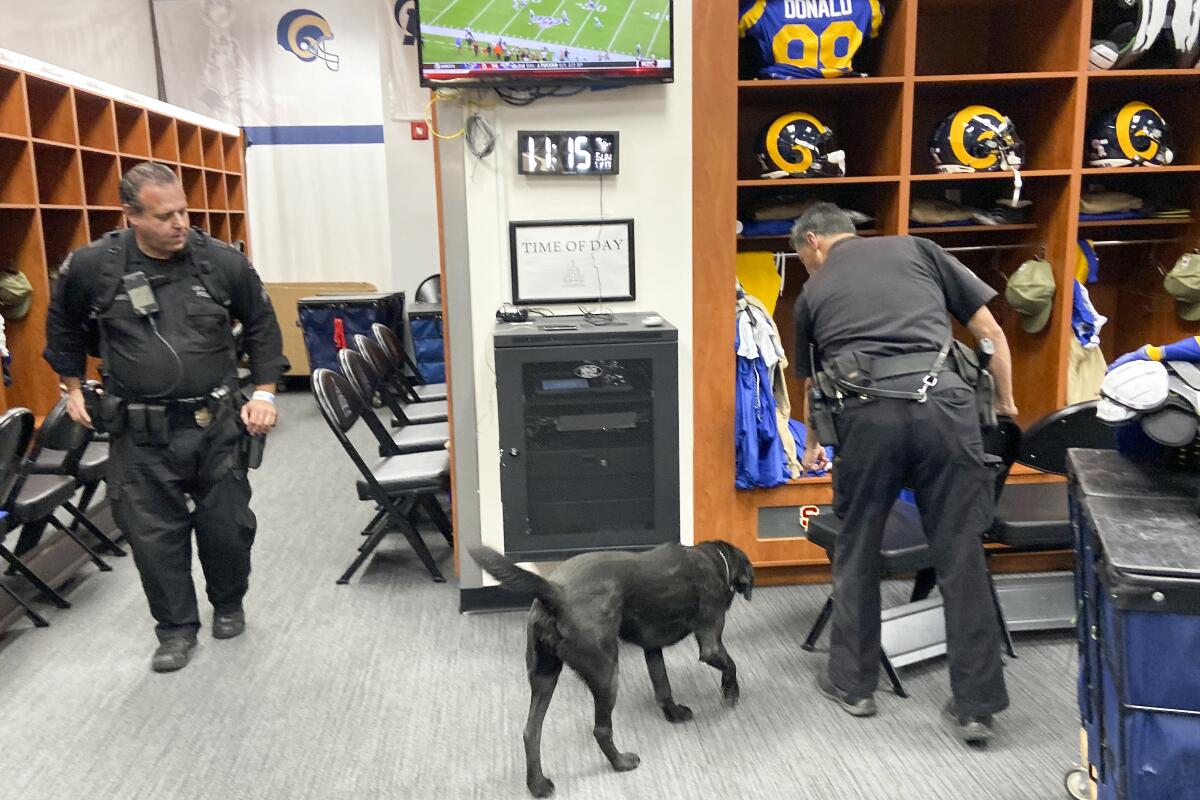
It’s a “Salute to Service” game, which honors the military, so all the players get camouflage caps and gloves in their lockers, as well as khaki hoodies.
Coach Sean McVay has his own small locker room, with two TVs tuned to “Sunday Ticket,” and a small refrigerator loaded with flavored San Pellegrino water, his favorite. The crew has provided his entire outfit, from his Salute to Service cap — which he’ll leave in his locker — to his camouflage Nikes. After games, Rams owner Stan Kroenke and team executives crowd into this room to discuss their game and watch what’s happening around the league.
Across the hall is a dressing room for the assistant coaches. They each have lockers with blue suit bags hanging on the right side, and identical camouflage shoes and caps (although assistant Jedd Fisch gets a visor, his preference.) The coaches will get seven or eight different pairs of color-coordinated Nikes during the season and, with all the uniform changes and NFL themes, already have received nine caps in 13 weeks.
In recent years, it’s become increasingly common for players from opposing teams to exchange jerseys. It happens virtually every week with the most in-demand players such as Donald and Todd Gurley. The Rams are one of the few teams that don’t pass along the cost of those jerseys to their players. Some teams charge players as much as $1,000 for giving a jersey to a player from another team.
These aren’t off-the-rack jerseys. They’re tailored to the players, and they are made far in advance of the season. So Gurley starts the season with many more than most players, the team knowing most of those jerseys will be exchanged.
Ravens quarterback Lamar Jackson has put together an MVP-caliber season that hasn’t gone unnoticed by the Rams.
“When I watch other games on TV, the uniforms are all we pay attention to,” Burger said. “Darwin will text me and say, ‘Turn on this game and check out this jersey.’ It might be a helmet or a visor a guy is wearing. You know how the uniform is supposed to look. If a guy’s socks are way down, or he has an undershirt that’s a color he’s not supposed to have, you notice.”
The crew has to be able to fix problems on the fly, ideally so players don’t miss snaps. For instance, sometimes a brutal collision might cause a facemask to bend. Typically, they dent inward a bit which makes them widen and therefore loosen the fit of the helmet. They need to be swapped on the sideline.
“It’s unbelievable, the job they do,” tackle Andrew Whitworth said. “To me, the equipment guys are kind of like offensive linemen. It’s one of those things where it’s expected, but if there’s one little thing that goes wrong, that’s the only time anybody knows that you’re doing your job. It’s like no one even knows you exist until you mess up.”
Some situations are unexpected and unavoidable. In this season’s opener at Carolina, Weddle took a knee to the helmet from a leaping Christian McCaffrey, and suffered a significant cut on the top of his head. That was a freak injury. Burger’s theory is Weddle, who wears a helmet radio, was cut by the matchbox-sized receiver that fits inside the helmet’s padding.
Only Weddle on defense and quarterback Jared Goff on offense wear helmet radios. But Zebra Technologies places an RFID chip on the back of every set of shoulder pads, and inside all the footballs, as part of a player- and ball-tracking system that allows Next Gen Stats to provide the NFL with extensive data and analytics. . Before kickoff, a technology crew stops by the locker room to test the tracking system.
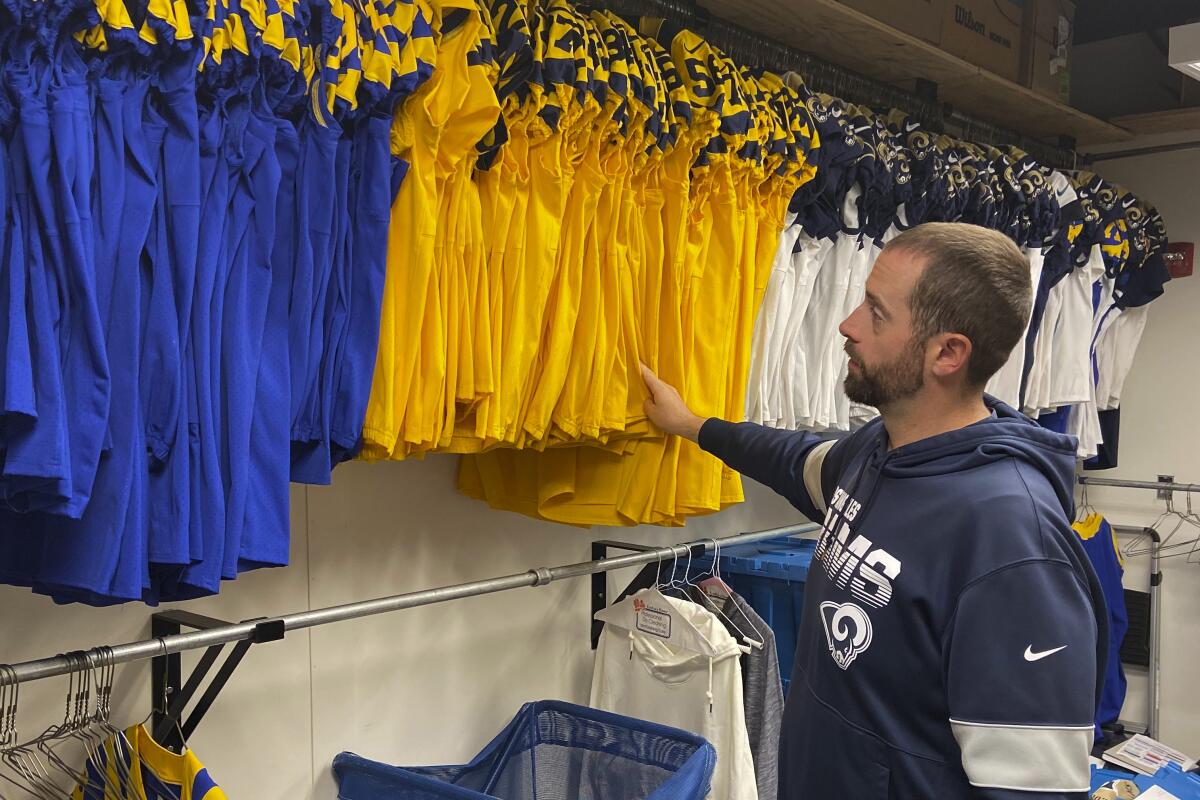
Cornerback Jalen Ramsey, making his Rams home debut, has volunteered to be “mic’d up” for the game, so a tiny microphone is attached to the neckline of his jersey. The two guards wear microphones too, to capture sound at the line of scrimmage.
At noon, roughly two hours before the players arrive, Burger walks out to inspect the field. He’s looking for thin spots in the grass, and will alert the grounds crew and the coaches if/when he finds any trouble spots. He wants to feel the firmness of the surface too, so he can decide which length cleat studs will work best. Back in the locker room, he checks the two large digital clocks — one for time of day, and the other a countdown to kickoff — to make sure they’re synchronized.
During pregame warmups, players don’t randomly take the field. They come out in groups, with the precise timing listed on boards inside the locker room.
There’s a ritual to the pulling on of the shoulder pads, with players often using the same assistants before every game. Defensive tackle Michael Brockers, for instance, has used Bloomer as his helper for every game of his eight seasons with the team.
“It may be a little tradition thing,” Brockers said. “It works, so I just stay with it.”
After weeks of Rams followers wondering why Todd Gurley was not getting the ball enough, he carries L.A. to a 17-7 win over the Bears.
As kickoff nears, the scene in the locker room grows increasingly intense. The rap music is turned up so loud, the thumping bass almost has the walls vibrating. There is activity going on everywhere.
Gurley is bobbing his head to the beat. The offensive line sits together in a cluster of locker chairs, wordlessly watching the other NFL games on one of the eight TVs positioned around the room.
Weddle, wearing headphones and listening to techno pop, is doing a mini-workout down the middle of the room to loosen up — high-knees, shuffle step, crossover. And Burger and his staff zig-zagging from player to player, helping them with their pads.
When the team leaves for the start of the game, a member of the equipment staff stays behind and sets up the locker room for halftime. That entails pulling two side-by-side movie screens from the ceiling and setting up overhead projectors in front of both. One is designated for offense, and the other for defense. At halftime, coaches show still photographs of formations on those — the NFL does not allow for video to be used — and use grease pens to draw up plays.
Under construction at SoFi Stadium are two rooms adjacent to each locker room that are equipped with video boards. There, instead of going back to the locker room at halftime, the offense and defense will be able to meet separately at halftime to make adjustments.
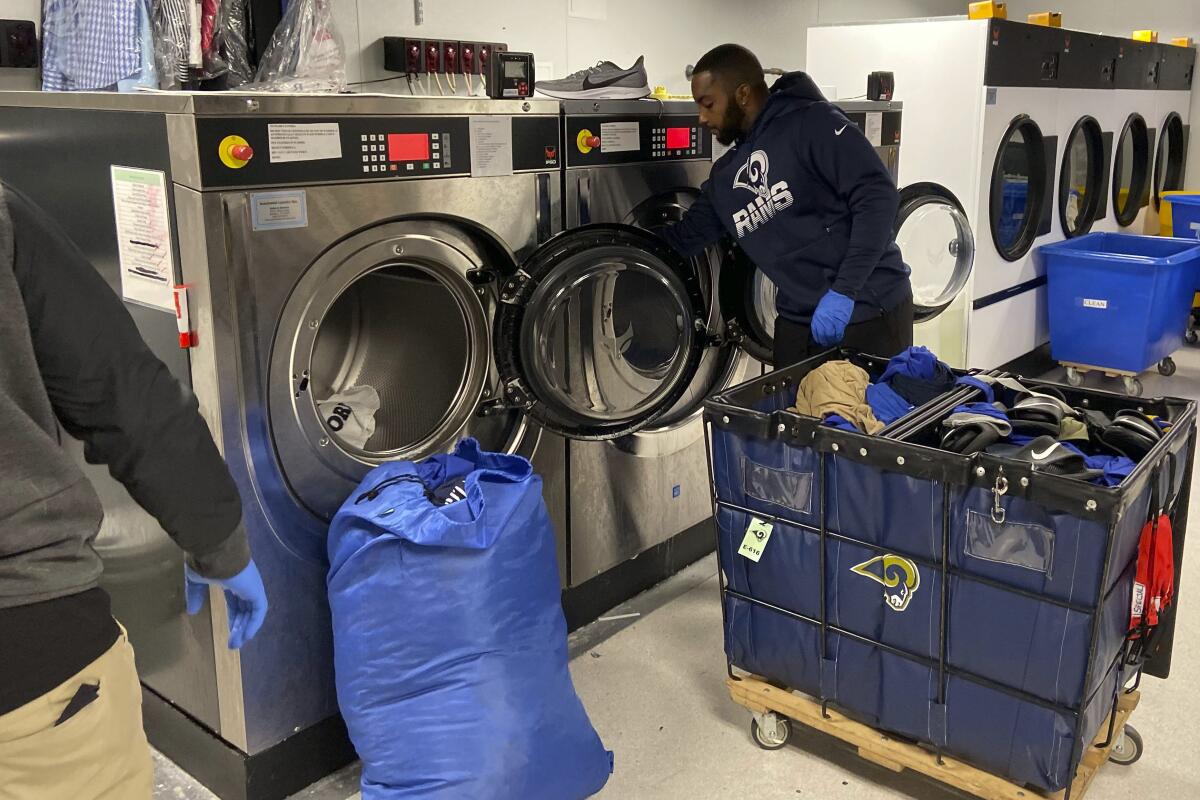
Whereas most of the equipment staff is on the sideline for the game, some members stay back and start repacking the trucks for the trip back to the facility. For road games, one of the trucks will be fully packed and driven to the airport during the game, so there’s less of a delay on the tarmac for the flight home.
After the game, while the players shower, dress, and handle their media responsibilities, Burger and his staff quickly grab dinner off the food tables, finish packing, and make the drive back to Cal Lutheran. There, they begin the massive job of unpacking, cleaning the uniforms, and disinfecting the shoulder pads.
The bright yellow color-rush jerseys are ready to go for the next game, a Monday night showdown with the Baltimore Ravens.
Midnight comes and goes. Sleep is for the offseason.
More to Read
Go beyond the scoreboard
Get the latest on L.A.'s teams in the daily Sports Report newsletter.
You may occasionally receive promotional content from the Los Angeles Times.

